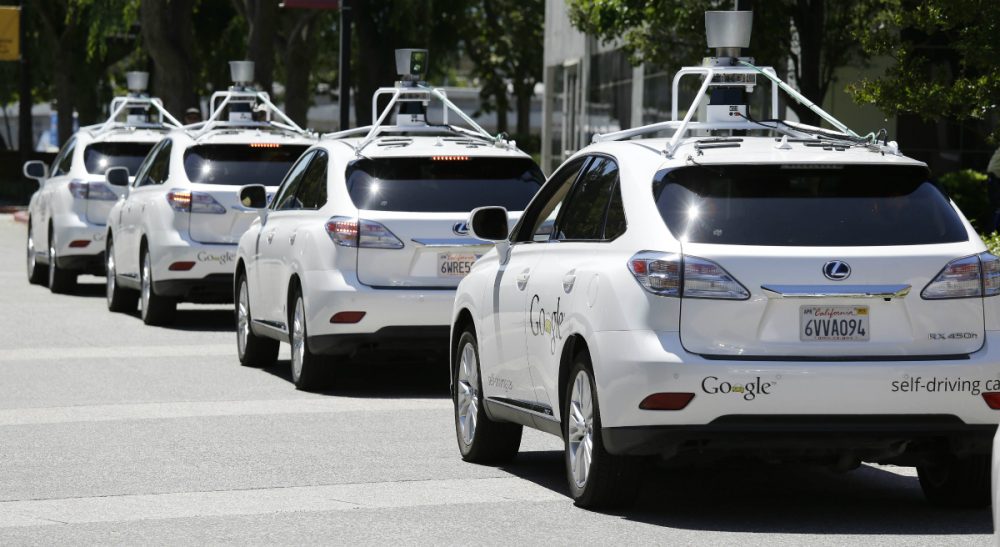Advertisement
Could Self-Driving Cars Ever Master Boston's Streets?

Imagine a day in which a fleet of robotic cars outfitted with an array of onboard sensors whisks people efficiently along Boston streets. Traffic moves smoothly. There’s no honking. No squeal of tires. No shouted expletives or rude gestures.
No kidding?
... while I admit that driving in Boston is unique, I argue there is a kind of Darwinian logic that governs the roads, a set of unwritten rules one learns in order to navigate around here.
Driverless, robotic cars, long a vision of science fiction, futurists and techno-geeks, are about to become a reality. Google unveiled its prototype self-driving car last spring and has bragged that its test models have already racked up 700,000 accident-free miles. Similar programs are underway in Europe and Japan. MIT robotics professor John Leonard visited Google’s headquarters recently to go for a ride and was duly impressed. “I had complete confidence in the car,” he said.
That may be on the mild and polite byways of Mountain View, Calif., but would such a car work on the gladiatorial streets of Boston? Even Professor Leonard has his doubts. “Dealing with the unexpected is a challenge,” Leonard said. “Boston drivers seem to do the unexpected more than other drivers.”
Indeed. Drivers in Boston have a notorious reputation. I learned to drive in Boston, which means that anywhere else in the country, I’m considered a maniac. And while I admit that driving in Boston is unique, I argue there is a kind of Darwinian logic that governs the roads, a set of unwritten rules one learns in order to navigate around here.
Take stoplights. You quickly learn that the first thing you do after the light turns green is to look both ways in order to let those running the light time to clear the intersection. After all, as most Boston drivers know, traffic signals are just a suggestion.
Or rotaries, those confounding free-for-alls that seem a uniquely Massachusetts form of torture. The official state driver’s manual tells you to approach carefully, yield to traffic, use your blinker and, when you see an opening, enter cautiously. Do that and you’ll likely be waiting all day. Rotaries are a battle for supremacy. You approach, pick your mark — usually a car that seems to be moving tentatively or that has more to lose than you, a Mercedes sedan or BMW, say, then gun it and ignore the honking.
Last spring, the state put up tongue-in-cheek “Use Yah Blinkah” billboards to encourage drivers to follow more conventional etiquette. The billboards lasted about a week. Though funny, the campaign was futile. As any Boston driver knows, using your directional signal before switching lanes only allows the guy behind you time to speed up and cut you off.
Leonard seems confident that robotic cars could be programmed to deal with all this. “Robots should just be able to navigate the way we navigate,” he said.
Advertisement
As any Boston driver knows, using your directional signal before switching lanes only allows the guy behind you time to speed up and cut you off.
Perhaps. But I’m not sure I’m ready to share the road with a robotic car. For one thing: I like to drive. I still find it exhilarating and challenging … sometimes even relaxing, despite the traffic and aggravations.
I’m not alone. A survey of British drivers last year found that only a third would be willing to give up their cars for a self-driving car, either out of a concern for safety or the loss of freedom. Even if engineers can teach robot cars to integrate with Boston drivers, what’s the fun of cutting off a robotic car or throwing it the finger? For another, despite all the frustrations, Boston roads and Boston drivers are uniquely Bostonian, like triple-deckers, lobster rolls and dropped r's.
I understand that progress may one day force us to give up our cars, but why be in a rush to turn Boston into a homogenous, city of the future?
Related:
